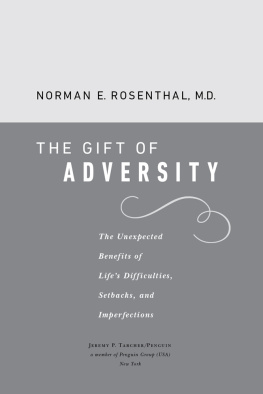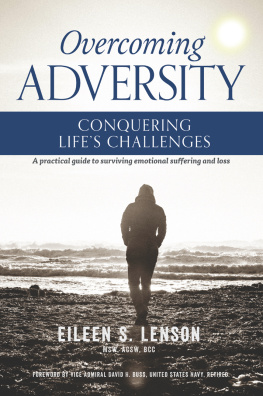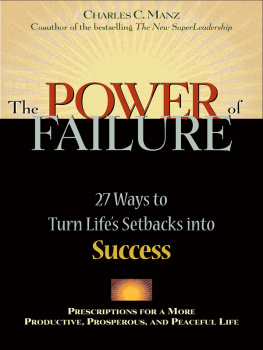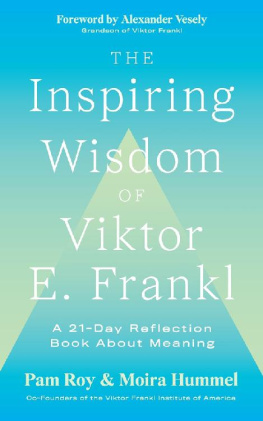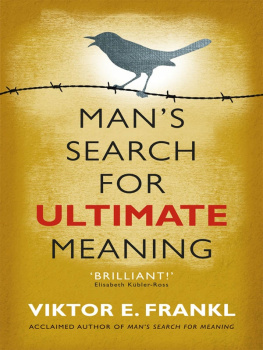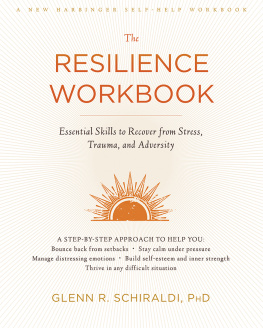
JEREMY P. TARCHER/PENGUIN
Published by the Penguin Group
Penguin Group (USA), 375 Hudson Street,
New York, New York 10014, USA

USA Canada UK Ireland Australia New Zealand India South Africa China
Penguin Books Ltd, Registered Offices: 80 Strand, London WC2R 0RL, England
For more information about the Penguin Group visit penguin.com
Copyright 2013 by Norman E. Rosenthal, M.D.
All rights reserved. No part of this book may be reproduced, scanned, or distributed in any printed or electronic form without permission. Please do not participate in or encourage piracy of copyrighted materials in violation of the authors rights. Purchase only authorized editions.
Published simultaneously in Canada
The writing exercise is from Opening Up: The Healing Power of Expressing Emotions by James W. Pennebaker, Ph.D., 1997, the Guildford Press. Reprinted by permission of the Guildford Press.
One Art is from The Complete Poems 19271979 by Elizabeth Bishop. Copyright 1979, 1983 by Alice Helen Methfessel. Reprinted by permission of Farrar, Straus and Giroux LLC.
Most Tarcher/Penguin books are available at special quantity discounts for bulk purchase for sales promotions, premiums, fund-raising, and educational needs. Special books or book excerpts also can be created to fit specific needs. For details, write: Special.Markets@us.penguingroup.com.
Library of Congress Cataloging-in-Publication Data
Rosenthal, Norman E.
The gift of adversity: the unexpected benefits of lifes
difficulties, setbacks, and imperfections / Norman E. Rosenthal, M.D.
p. cm.
Includes index.
ISBN 978-1-101-61305-4
1. Disappointment. 2. Adjustment (Psychology). 3. Adaptability (Psychology). 4. Resilience (Personality trait). 5. Rosenthal, Norman E. I. Title.
BF575.D57R67 2013 2013015299
155.24dc23
Neither the publisher nor the author is engaged in rendering professional advice or services to the individual reader. The ideas, procedures, and suggestions contained in this book are not intended as a substitute for consulting with your physician. All matters regarding your health require medical supervision. Neither the author nor the publisher shall be liable or responsible for any loss or damage allegedly arising from any information or suggestion in this book.
This publication is designed to provide accurate and authoritative information in regard to the subject matter covered. It is sold with the understanding that the publisher is not engaged in rendering legal, accounting, or other professional services. If you require legal advice or other expert assistance, you should seek the services of a competent professional.
While the author has made every effort to provide accurate telephone numbers, Internet addresses, and other contact information at the time of publication, neither the publisher nor the author assumes any responsibility for errors, or for changes that occur after publication. Further, the publisher does not have any control over and does not assume any responsibility for author or third-party websites or their content.
FOR
NORMAN ROSENTHAL
(19201942)
AND ARI
INTRODUCTION
Sweet are the uses of adversity,
Which, like the toad, ugly and venomous,
Wears yet a precious jewel in his head.
SHAKESPEARE, AS YOU LIKE IT
That which does not kill us makes us stronger.
FRIEDRICH NIETZSCHE
He who learns must suffer. And even in our sleep, pain that cannot forget falls drop by drop upon the heart, and in our own despair, against our will, comes wisdom to us by the awful grace of God.
AESCHYLUS, AGAMEMNON
O ne way to think about this book is as a collection of stories that happen to be true. They are stories I have collected through lifes journey, stories I have told to myself and others that cluster around a theme: What has life dealt me and what have I learned from it? What wisdom have I gleaned from the fascinating people whom fortune has put in my path and the curious times in which I have lived?
Somehow it is part of my nature, whenever something curious or unexpected happens, to ask myself, What can I learn from this? As I reflected on the stories I have collected, I reached an unexpected conclusion: All of them dealt with some sort of adversity, plus what I had learned from it. It has been said that you cannot become a master sailor on calm seas; so too you cannot navigate life successfully without learning how to handle adversity. To be sure, adversity is by its very nature painful and unwelcome. The trick then is how to move beyond these initial feelings and find something of value in the experience. That is the essence of this book: Put simply, the lessons embedded in these stories are the sweet uses of adversity. What does not kill us, to paraphrase Nietzsche, makes us strongerbut only if we learn from our mistakes and misfortunes.
It makes sense from an evolutionary point of view that we have the innate tools for such learning. Those ancient ones who learned best from danger, obstacles, setbacks, and reversals of fortune were more likely to survive long enough to transmit their DNA to future generations. Even so, although our ability to learn from adversity may be a highly selected trait, it can no doubt be greatly improved by experience and guidance, as I hope this book will show.
Adversity, it seems to me, can be divided into three categories. First, there is the adversity that results from plain bad lucksuch as being in the wrong place at the wrong time, or being born with some genetic disease. Second is the adversity that we bring upon ourselves by making some mistake or error of judgment. The pain of this type of adversity is compounded by feelings of guilt and shame at having been responsible for the misfortune. Finally, there is the adversity that we actually seek out, as when we take a calculated risk, set off on an adventure, or let slip the dogs of war. Although adversity is not generally the stated goal of such an enterprise, it is an accepted and integral part of the process. Each type of adversity carries its own challenges and has the potential to yield its own form of wisdom. All will be represented in one form or another in this book.
As a psychiatrist, whenever things go wrong in the lives of my patients, I am always inclined to ask them: Has anything like this ever happened to you before? What did you do then? And how did it work out? Then, after the issue is sufficiently resolved, I often ask, What lesson can you take from this event? How can you do things differently to prevent it from happening in the future? It is natural for me to ask these questions, not only as a result of my training, but because they are the same questions I always ask myselfand have done as long as I can rememberwhenever things dont work out as I had hoped. Over time these lessons accumulate, and, if we are lucky, in the words of Aeschylus, drop by drop comes wisdom, the bittersweet fruit of adversity. Crises are learning opportunities. If we can begin to draw connections between what we have learned from crises, we can work out a systematic way of dealing with them. Research shows that many people become happier as they get older. Perhaps that is a result of the wisdom we acquire over the years, which helps us avoid trouble when possible and deal better with it when it arises.

